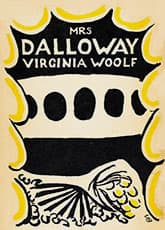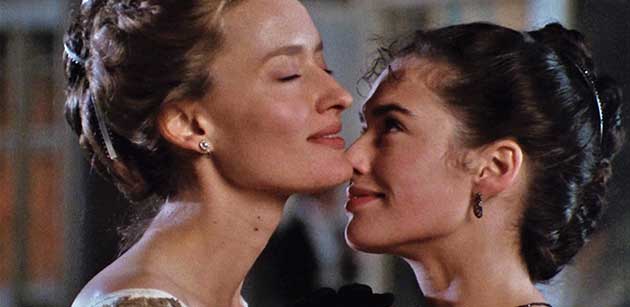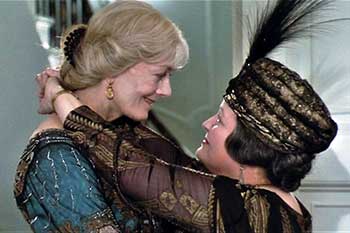Mrs Dalloway
Critique • Quotes • At the movies
 First edition
First editionFirst publication
1925
Literature form
Novel
Genres
Literary
Writing language
English
Author's country
England
Length
Approx. 72,000

Young Clarissa (Natascha McElhone) and Sally (Lena Headley) in Mrs Dalloway's kissing scene.
Mrs Dalloway embodied
Mrs Dalloway (1997): Film, 97 minutes; director Marleen Gorri; writer Eileen Atkins; featuring Vanessa Redgrave, Natascha McElhone, Michael Kitchen, Rupert Graves, Lena Headley, Amelia Bullmore
Any screenplay for an adaptation of Mrs Dalloway must face obvious and seemingly insurmountable difficulties, which may be why it was seven decades after the novel's publication before a film first appeared.
But the great British actress—and sometimes writer—Eileen Atkins, who has had a long association with the works of Virginia Woof, succeeded as well as could be expected.
The biggest hurdle faced by her script was, of course, that the novel takes place almost entirely in the characters' heads, especially in that of Clarissa Dalloway. This is the same challenge faced by the adaptations of James Joyce's stream-of-consciousness novel, Ulysses, though the solutions were very different.
While the Joyce films went for fantasy scenes displaying what was going on in characters' random thoughts, Atkins opted to have her characters act out realistically the more ordered mental events of Woolf's characters. Instead of getting Clarissa's inner monologue assessing those in her social circle, for instance, we see the characters as they actually behave at her party.
Another challenge to be dealt with is the temporal jumps in Clarissa's and others' minds. This is easily accomplished in the novel, often with only a few lines of text needed to dispense with a remembered past experience or with only a few words to fleetingly call back to an earlier time. The visual medium though requires a greater commitment to these thoughts.
So, as Clarissa daydreams about her younger years, we get not her impresssionistic thoughts but rather complete and detailed scenes of what took place back then, with different actors playing the younger selves of Clarissa, Peter, Sally and others.
This transitioning back and forth can be disruptive to the point that viewers can lose track of where and when they are in the story. It also fails to give full expression of the novel's stream of consciousness in which memory and feeling are inextricably mixed.
A case in point: In the novel, the older Clarissa rhapsodizes in a few excitingly written sentences about the revelatory experience of her youthful friend Sally once kissing her on the lips. But in the film when Clarissa, played by Vanessa Redgrave, thinks of the event, we see the actual kiss in a flashback and it's up to actor Natascha McElhone as the young Clarissa to give visual expression to what the kiss meant to her. All McElhone, perhaps best known as Karen in the Californication series, can do is look pleasingly surprised and kind of moony. We don't get the experience as a near-religious epiphany.
Trailer for 1997 adaptation of Mrs Dalloway.
Which is not to say the scene isn't compelling and that the actors Redgrave, McElhone and Lena Headley, as young Sally, are anything less than stellar. They just can't convey everything the book does.
More effective may be Rupert Graves as the traumatized former soldier Septimus Warren Smith and Amelia Bullmore as his wife Rezia. They're fortunate in that their roles are less cerebral and they are better able to bring their characters to life—in the real life-and-death crisis they find themselves in.
Unfortunately though, their characters, as created by Woolf in the novel, barely cross paths with Clarissa's crowd. Filmgoers may be excused for wondering what their subplot has to do with the Mrs Dalloway story.
Still, I can't imagine a remake of this adaptation as this could be the finest film that could be made while remaining as faithful as possible to Woolf's difficult novel.
— Eric


